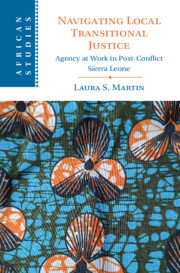Book contents
- Navigating Local Transitional Justice
- African Studies Series
- Navigating Local Transitional Justice
- Copyright page
- Dedication
- Contents
- Maps
- Acknowledgments
- 1 Agency in Times of Transitional Justice
- 2 Navigating Violence, Peace and Justice
- 3 Deconstructing Fambul Tok’s Discourse and Practice
- 4 Participant Experiences with Fambul Tok’s Program
- 5 Unrecognized Mechanisms, Normality and Everyday Realities in Transition
- 6 Activating Justice
- Appendix A: Informant Interview List
- References
- Index
- African Studies Series
4 - Participant Experiences with Fambul Tok’s Program
Interpretation, Appropriation and Agency
Published online by Cambridge University Press: 13 July 2023
- Navigating Local Transitional Justice
- African Studies Series
- Navigating Local Transitional Justice
- Copyright page
- Dedication
- Contents
- Maps
- Acknowledgments
- 1 Agency in Times of Transitional Justice
- 2 Navigating Violence, Peace and Justice
- 3 Deconstructing Fambul Tok’s Discourse and Practice
- 4 Participant Experiences with Fambul Tok’s Program
- 5 Unrecognized Mechanisms, Normality and Everyday Realities in Transition
- 6 Activating Justice
- Appendix A: Informant Interview List
- References
- Index
- African Studies Series
Summary
This chapter examines the perceptions of communities and participants where Fambul Tok works. The program was designed to provide people with ritual spaces to discuss war-related experiences, but I suggest that the vast majority of participants neither desired nor enjoyed hearing about wartime experiences. The confessions at these organization-sponsored ceremonies were performances that sought to stimulate further development opportunities. The space did, however, provide an opportunity to address other, more contemporary issues. This is exemplified through the story of a heated chieftaincy conflict. The organization’s presence and the ceremony provided a forum through which this conflict played out, exemplifying how existing social structures play a critical role in shaping local transitional justice programs. I explore how pre-existing hierarchies, social status and individual agency influenced how different people engaged with the program. This exemplifies the diversity of needs and priorities in communities and how people engage with these mechanisms for different reasons. It provides a comprehensive analysis of how local transitional justice programs shape and are shaped by the various actors at play (both staff and participants), which has implications not only for TJ mechanisms but development programs more broadly.
Keywords
- Type
- Chapter
- Information
- Navigating Local Transitional JusticeAgency at Work in Post-Conflict Sierra Leone, pp. 96 - 133Publisher: Cambridge University PressPrint publication year: 2023



